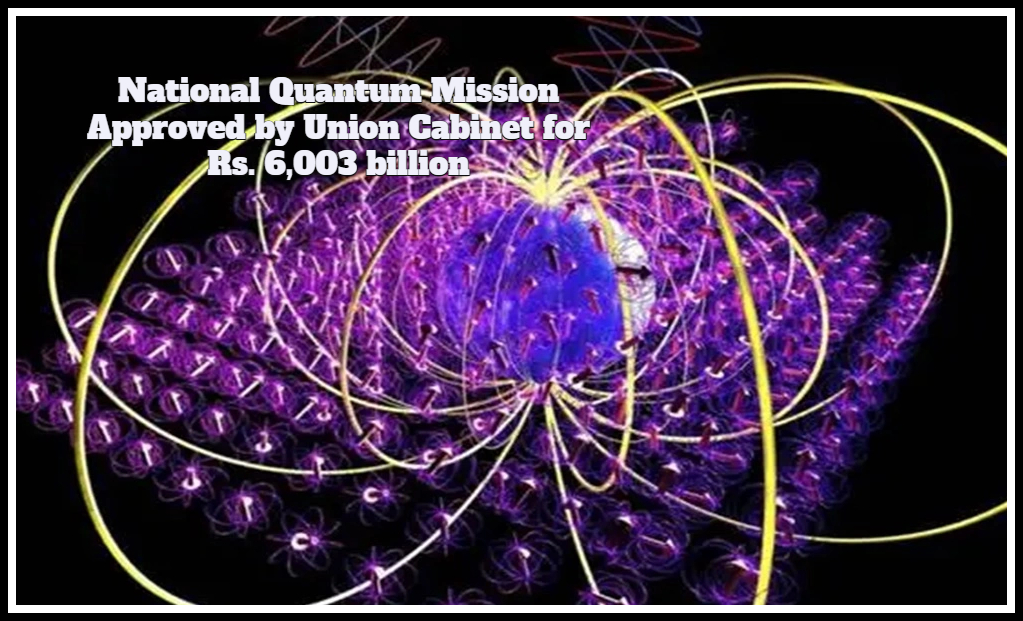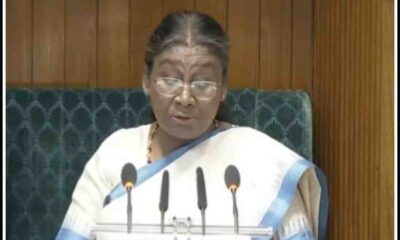News
National Quantum Mission Approved by Union Cabinet for Rs. 6,003 billion
Published
1 year agoon

India is the seventh country to have a dedicated National Quantum Mission , joining the United States, Austria, Finland, France, Canada, and China
The National Quantum Mission, which aims to advance scientific and commercial research and development in quantum technology, was approved by the government on Wednesday. The mission will cost Rs 6,003,65 crore between 2023–2024 and 2030–2031.
The National Quantum Mission (NQM), which was approved at a meeting of the Union Cabinet presided over by Prime Minister Narendra Modi, will foster the nation’s ecosystem and speed up the economic growth driven by quantum technology.
Read Also:- “Embassy in Fighting Zone, Avoid It”: Centre For Indians Trapped in Sudan.
According to Science and Technology Minister Jitendra Singh, “NQM will give India a quantum jump in this arena.”
After the United States, Austria, Finland, France, Canada, and China, India will be the seventh country to have a dedicated quantum mission.
“They are also in the research and development stage.” None of them have begun to apply it (quantum technology). “We’ll be on par as well,” Singh said.
“In eight years, the new mission aims to develop intermediate scale quantum computers with 50-1000 physical qubits on various platforms such as superconducting and photonic technology,” he said.
He stated that some of the mission’s deliverables include multi-node quantum networks with quantum memories, intercity quantum key distribution over 2,000 km, and satellite-based secure quantum communications between ground stations over a range of 2000 km within India. He also mentioned long-distance secure quantum communications with other nations.
A mission director will be in charge of the National Quantum Mission, which will have a separate secretariat.
According to I&B Minister Anurag Thakur, the mission’s Governing Body will be presided over by a well-known scientist or businessperson in the technology, business, or research fields.
According to him, the Principal Scientific Advisor will serve as the chair of the Mission Technology Research Council, which will serve as the Governing Body’s scientific advisory body.
According to Singh, the mission will aid in the development of highly sensitive atomic magnetometers and atomic clocks for precise timing, communications, and navigation.
In order to create quantum devices, it will also support the design and synthesis of quantum materials like superconductors, innovative semiconductor structures, and topological materials, according to Singh. For use in quantum communications, sensing, and metrological applications, single photon sources/detectors and entangled photon sources will also be developed, according to him.
According to Singh, top academic and national research and development organisations will establish four thematic hubs (T-Hubs) on the topics of quantum computing, quantum communication, quantum sensing and metrology, and quantum materials and devices.
“The hubs will focus on generation of new knowledge through basic and applied research as well as promote R&D in areas that are mandated to them,” the minister stated.
The Raman Research Institute, the Jawaharlal Nehru Centre for Advanced Scientific Research, and the S. N. Bose National Centre for Basic Sciences, all of which are located in Bengaluru, are just a few organisations, according to Singh, that are actively engaged in quantum research. Additionally, he added, 20 other institutes are also involved in this sector’s research and development.
According to Singh, the mission can raise the nation’s technology development ecosystem to a level where it is competitive on a global scale.
The mission would have a significant positive impact on the financial, energy, health, communication, and pharmaceutical industries as well as space applications.
According to Singh, it will significantly advance national goals like “Digital India,” “Make in India,” “Skill India,” “Stand-up India,” “Start-up India,” “Self-reliant India,” and the Sustainable Development Goals (SDG).
Credent TV Editorial Team

You may like
-


North Korea asserts that the test of a multiple-warhead missile was successful
-


The Student Wing of Congress storms the Exam Body NTA office and locks it from within
-


“During President Murmu’s address to Parliament, PM Modi was shown 73 times, and LoP Rahul Gandhi was shown six times”: Congress
-


NASA contracts Elon Musk’s SpaceX to deorbit the International Space Station in 2023.
-


A Caution For The CBI In The Delhi Court’s Arvind Kejriwal Custody Order
-


Bar Council of India requests that bar associations abstain from demonstrating in opposition to new criminal laws
